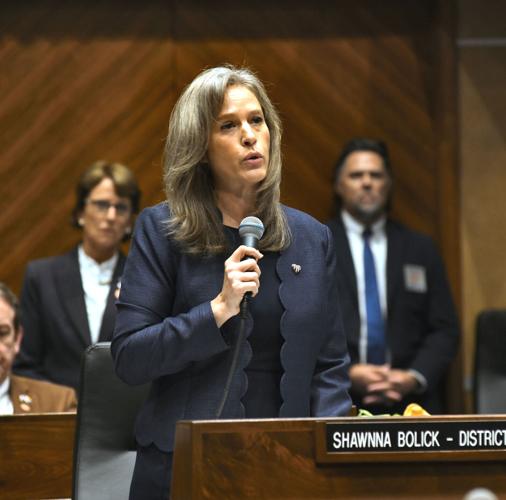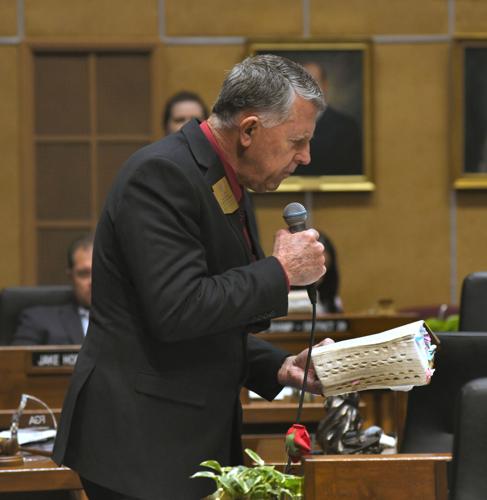PHOENIX — State senators voted Wednesday to repeal the 1864 abortion law, leaving just a procedural move to send it to the governor for her anticipated signature.
The 16-14 vote came after a coalition of all Democrats and two Republicans defeated various procedural motions designed to preclude final action on the measure, which was approved a week earlier by the House on a 32-28 vote.
One of the two Republicans in the GOP-controlled Senate who voted for repeal, Shawnna Bolick of Phoenix, detailed her own three pregnancies, including one that ended in the need for a medical abortion. She said her point was to explain that not all pregnancies are the same.

Sen. Shawnna Bolick of Phoenix explains why she was one of the two Republicans in the GOP-controlled Senate who joined Democrats in voting for repeal of the 1864 law that bans nearly all abortions. Speaking on the Senate floor Wednesday, Bolick detailed her own three pregnancies, including one that ended in the need for a medical abortion. She said her point was to explain that not all pregnancies are the same.
Even when Democratic Gov. Katie Hobbs signs the repeal legislation — an aide said that is likely to come Thursday — it won’t mean the law, banning abortion except to save the mother’s life, immediately goes away and leaves only a more recent law allowing abortion until the 15th week of pregnancy on the books.
That’s because the repeal, like most measures, cannot take effect until the 91st day after the Legislature adjourns for the year. But with key issues unresolved, including the state budget and additional aid for K-12 education, there are at least several weeks before that is set to occur this year.
That means the abortion law, which dates to territorial days, would still be in place when there is a final order from the Arizona Supreme Court, formalizing its April 9 ruling declaring the older law trumps the newer 15-week limit.
Attorney General Kris Mayes figures the Supreme Court ruling is set to take effect on June 27.
Mayes, a Democrat, has asked the justices to delay the effective date of their ruling for up to an additional 90 days so she can weigh whether there is a legal reason to seek review by the U.S. Supreme Court. There is no guarantee they will grant her request.

Republican Sen. David Farnsworth of Mesa pulled out his Bible while railing on the Senate floor against repeal of the abortion law. He told legislators to remember the biblical story of how God destroyed Sodom and Gomorrah because of the sinful ways of their residents.
On Wednesday, opponents of the repeal blasted the two Senate Republicans who sided with the Democrats: Bolick, and T.J. Shope of Coolidge.
While not calling them out by name — prohibited by Senate rules — Sen. David Farnsworth, R-Mesa, told colleagues and others this is what happens when conservatives fail to hang together in the Republican-controlled Legislature.
But Sen. Ken Bennett, R-Prescott, who voted against repeal, said it was improper to criticize the pair for not voting with other Republicans. He said all lawmakers are entitled to vote their conscience.
Bolick, while voting for the repeal, was highly critical of Planned Parenthood and what she called “the horrors inside the abortion industry.’’
She also cited a political component.
Bolick said she believes a ban at 15 weeks — what the law would be once the old law is officially repealed — is a far preferable choice for voters who will go to the polls in November than a more more far-reaching initiative.
The initiative proposal, which supporters hope to get on the ballot, would allow abortions in Arizona under all circumstances up to the point of fetal viability, generally considered to be between 22 and 24 weeks. Its opponents point out it includes exceptions allowing the procedure beyond that point in cases not only to save the life of the mother but also to preserve the woman’s physical or mental health.
Sen. Wendy Rogers, R-Flagstaff, suggested some Republicans were voting for the repeal because it was “politically expedient’’ to find a “middle ground’’ between the territorial-era law and the initiative.
“It’s politically astute because we might lose votes, we might lose the Legislature, we might lose the presidential election,’’ she said of the November election. “And I say to you, it’s more important to do what’s right because, maybe not in this life, but after this life, we will meet our maker.’’
Religion also played into comments from other foes of repeal. Sen. David Farnsworth, R-Mesa, pulled out his Bible.
“God is watching,’’ he told colleagues. “And on judgment day we will all stand before the lord, Jesus Christ, and we will confess that he is the Christ.’’
If that didn’t sink in, Farnsworth mentioned the biblical story of how God destroyed Sodom and Gomorrah because of the sinful ways of their residents.
But Sen. Eva Burch, D-Mesa, who publicly disclosed how she needed to terminate two pregnancies for medical reasons, said it is inappropriate for one group to impose its religious beliefs on others.
“I do not fear for my soul,’’ she said.
“They were the right decisions for me,’’ Burch continued. “And I don’t have to follow your religion in this country.’’
Bennett, for his part, said the decision to vote against repeal was simpler. He said it came down to a balancing test.
On one hand, Bennett said there are gaps in the old law.
For example, he said, there should be exceptions for rape and incest. And he said there should be allowances for situations of severe fetal defects.
But the alternative — repealing the old law and leaving the law at 15 weeks — is unacceptable, he said.
“I think 15 weeks is too long,’’ Bennett said.
Sen. J.D. Mesnard, R-Chandler, who also voted against repeal, said what sometimes gets lost in the debate is that some pregnancies are not planned.
“Candidly, I don’t know that those of us in the pro-life community have done a great job in standing up for women in that situation,’’ Mesnard said. He said more needs to be done to support them.
But he said his own experience convinces him the discussion of abortion needs to go beyond the claim that women have a “right to choose.’’ Mesnard said there needs to be an acknowledgment “there’s a second person in the equation.’’
Tto underline that point, he played a recording of the fetal heartbeat of his first-born daughter in the first trimester, before 13 weeks.
At least part of the debate centered around exactly how to label the statute that lawmakers chose to repeal.
It is true it dates to the first Territorial Legislature in 1864. Burch said that fact alone should get the attention of lawmakers.
“I don’t want us honoring laws about women written during a time when women were forbidden from voting because their voices were considered inferior to man,’’ she said.
What also is true is that the Legislature in 1977 did a total recodification of the criminal code, including the territorial-era abortion laws.
Senate Majority Leader Sonny Borrelli, R-Lake Havasu City, said Democratic lawmakers, rather than taking the opportunity to seek repeal at that time, voted for the revisions.
But Sen. Anna Hernandez, D-Phoenix, whose procedural motions paved the way for Wednesday’s Senate vote for repeal, said foes were “grasping at straws’’ by using that 1977 action.
First, she noted, that legislation — more than 100 pages with 180 sections — was promoted as simply renumbering the old statutory provisions. Hernandez said it never was meant as an opportunity to debate each and every section.
More to the point, she noted that occurred four years after the U.S. Supreme Court, in its historic 1973 ruling in Roe v. Wade, declared a constitutional right to terminate a pregnancy. That, Hernandez said, meant there was no reason to even revisit the wording or try to repeal it, as it was no longer enforceable.
Its continued presence on the statute books only became legally relevant in 2022 when the U.S. justices overturned Roe. That returned decisions on abortion laws to the states and, the Arizona Supreme Court ruled last month, allowed Arizona to once again enforce the never-repealed law.
Sen. Jake Hoffman, R-Queen Creek, criticized the fact that the proposal to repeal the measure never went through the regular legislative process but came directly to the Senate floor, denying opportunities for debate and to add amendments.
For example, Hoffman wanted to add language to require abortion providers, when they have a patient who was the victim of a rape, to report that to law enforcement.
Burch, however, pointed out that measures to repeal the old law have been proposed for at least the last six years. None have gotten a hearing, forcing Democrats to use procedural moves to bring the issue directly to the floor.
“You have had the opportunity to bring our bills to committee over and over and over again,’’ she said. “And if you refuse to hear our bills when they are popular with the public and it’s what the people of Arizona want, then we are going to use the tools and resources available to us to make sure that our constituents are being heard.’’
Arizona's Democratic leaders get enough votes to repeal 19th century abortion ban





